Лаборатория молекулярных основ стрессоустойчивости растений
|
Руководитель: Митюшкина Татьяна Юрьевна |
Лаборатория молекулярных основ стрессоустойчивости растений создана в составе Филиала ИБХ РАН в городе Пущино в 2017 г. Организация и финансирование Лаборатории осуществляется за счет средств мегагранта правительства РФ № 14.W03.31.0003 по теме «Новые функции клеточного ядра и комплексная устойчивость растений картофеля к болезням и физиологическим стрессам» в рамках программы государственной поддержки научных исследований, проводимых под руководством ведущих ученых в российских образовательных организациях высшего образования, научных учреждениях, подведомственных Федеральному агентству научных организаций, и государственных научных центрах Российской Федерации.
Деятельность Лаборатории направлена на получение всесторонних знаний о механизмах комплексных стрессов в растениях, развитие новых подходов и идентификацию ключевых целевых генов, необходимых для защиты растений от влияния различных стрессов на рост, развитие и продуктивность растений. Основные научные интересы Лаборатории сосредоточены на изучении новых функций и процессов, обеспечивающих защитные реакции растения и локализованных в ядре растительной клетки, которое предположительно является центральным элементом координации ответов на биотические и абиотические стрессы. В настоящий момент ведется изучение комбинированного эффекта, оказываемого вирусным (Y-вирус картофеля, YBК) и бактериальным (Clavibacter michiganensis subsp., Cmm/Cms) патогенами и тепловым стрессом на растения картофеля, что может способствовать созданию новых сортов картофеля, адаптированных к изменению климата и его последствиям.

Состав научно-творческого коллектива. Эксперимент по идентификации сортов картофеля, устойчивых к множественному (биотическому/абиотическому) стрессу. Фитотрон в филиале ИБХ (Пущино).
Работа Лаборатории ведется в тесном сотрудничестве с компаниями-резидентами Индустриального парка Рогачево (ООО «Дока-Генные Технологии» и ООО «ИЦ «ФитоИнженерия») – ведущими российскими компаниями в области селекции и генетики картофеля – с целью разработки и применения новых подходов получения oздоровленного семенного картофеля (в краткосрочной перспективе) и развития программ селекции картофеля (в долгосрочной перспективе). Подобное взаимодействие позволит создать на основе полученных в Лаборатории результатов ряд новых и инновационных подходов и технологий, которые будут внедрены в реальный сектор российского агропромышленного комплекса.
В 2018 году в состав научного коллектива по Мегагранту вошли сотрудники лаборатории функциональной геномики и протеомики ИБХ РАН.

- Идентификация генотипов картофеля, контрастных по признаку устойчивости/восприимчивости к комбинированным биотическим и абиотическим стрессам, в частности, к совместному заражению вирусами и бактериями в условиях теплового стресса.
- Характеристика фенотипического, физиологического и молекулярного ответов контрастных генотипов картофеля на индивидуальный и комбинированный стрессы.
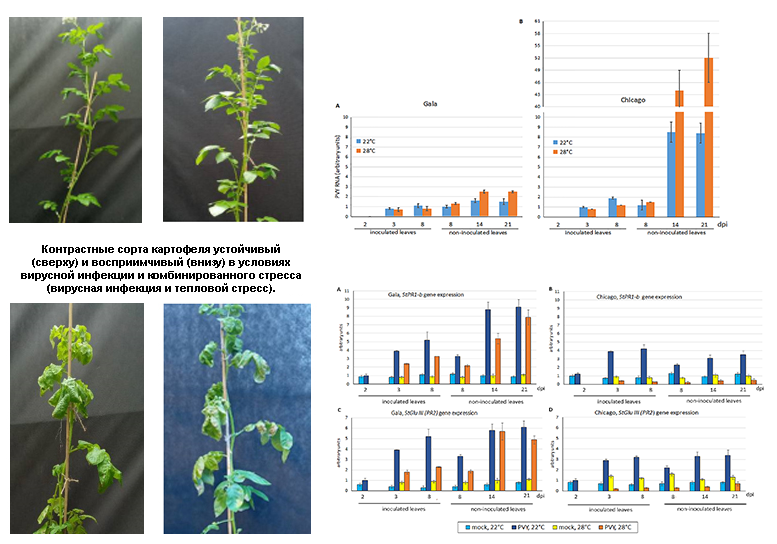
- Идентификация белков ядра, которые определяют устойчивость/толерантность растений картофеля к множественным стрессам.

Внутриклеточная локализация коилина в растениях дикого типа, незараженных или зараженных вирусом погремковости табака дикого типа (TRV), мутатным вирусом (с делецией гена белка 16К) TRV∆16K или только с временной экспрессией белка 16К (16К). N, ядро отмечено пунктирными линиями в соответствии с окраской DAPI; расположение ядрышка (No) и телец Кахаля (CBs) (показано стрелкой) подтверждено ко-локализацией с фибрилларином (маркер ядрышка и телец Кахаля). Масштаб 5 мкм.

Схематическое изображение белков, взаимодействующих с фибрилларином и коилином.
- Доказательство функций ключевых белков ядра, ответственных за устойчивость/толерантность к множественным стрессам с помощью гиперэкспрессии/умолкания генов, кодирующих эти белки в трансгенных растениях, и/или методами редактирования генома.
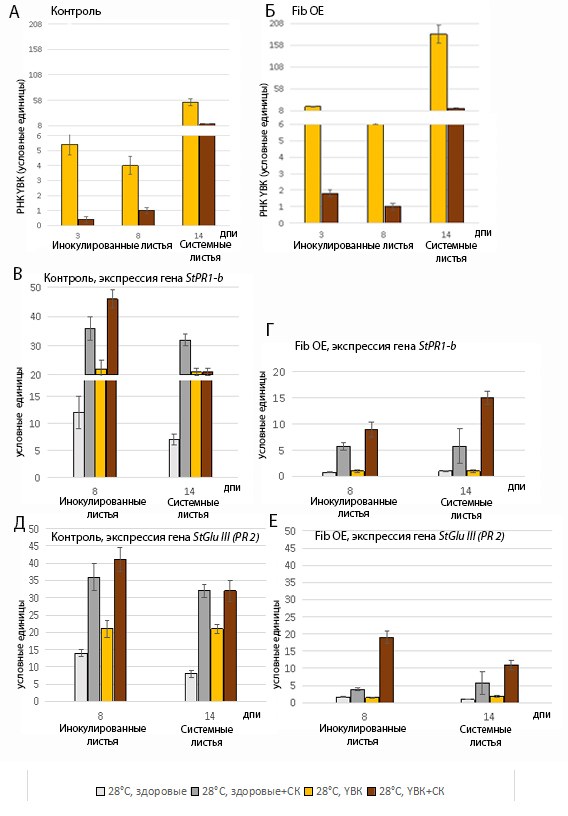
Влияние салициловой кислоты на уровень накопления РНК YВК (А,Б) и уровень экспрессии генов PR белков, включая ген StPR1-b (В,Г) и ген StGluIII (PR2) (Д, Е), растений картофеля сорта Чикаго (контроль) (А, В, Д), трансгенных растений картофеля с гиперэкспрессией фибрилларина (Fib OE, Б, Г, Е) при 28°С на 8 и 14 дни в отсутствии вирусной инфекции и при заражении YВК.
- Исследование молекулярных механизмов, обеспечивающих функции ядерных белков в процессе ответа на индивидуальные/множественные стрессы, и их взаимодействие с механизмами регуляции роста и развития растений картофеля.
- Разработка комплексных стратегий защиты картофеля для выполнения селекционных программ и производства оздоровленного семенного картофеля.

- Протеомный анализ (iTRAQ) контрастных сортов картофеля показал дифференциальную экспрессию большого числа белков в ответах на комбинированный стресс (YВК +тепло). Составлена база данных белков и потенциальных генов-мишеней, индуцируемых и подавляемых в условиях стресса.

________
Научный коллектив, работающий по мегагранту: Берзина Мария Яновна (аспирант), Бородулина Зоя Ивановна (старший лаборант, корпус), Голышев Сергей Александрович (к.б.н.), Долгов Сергей Владимирович (с.н.с., заместитель руководителя, д.б.н.), Дробышева Наталья Мирославовна (ст. лаборант, мат. ответственный), Ерохина Нина Михайловна (лаборант в теплице), Заяра Диана Андреевна (аспирант), Иванова Надежда Викторовна (лаборант, теплица), Игнатов Александр Николаевич (д.б.н ), Кабанова Анастасия Петровна (аспирант), Калинина Наталья Олеговна (д.б.н.), Макаров Валентин Владимирович (к.б.н.), Махотенко Антонида Викторовна (аспирант), Макарова Светлана Сергеевна (к.б.н.), Мельник Ирина Валентиновна (старший лаборант), Мельник Олеся Александровна (старший лаборант в корпусе), Мирошниченко Дмитрий Николаевич (ст.н.с., к.б.н.), Песяк Сергей Владимирович (к.б.н.), Спеченкова Надежда Андреевна (аспирант), Тарасенко Ирина Викторовна (н.с., к.б.н.), Фирсов Алексей Петрович (ст.н.с., к.б.н.), Фрунзе Анна Александровна, Ходыкина Майя Васильевна, Хромов Андрей Владимирович (аспирант), Цветков Владимир Николаевич (лаборант, теплица), Шалойко Любовь Анатольевна (н.с.), Ширшиков Фёдор Владимирович, Шлыков Дмитрий Андреевич (агроном).
_________
Основные белки телец Кахаля – коилин и ядрышка - фибрилларин выполняют роль сенсоров вирусной инфекции и стрессового (теплового) воздействия, посредством модификации активности поли(АДФ-рибозо)полимеразы, результатом чего является активация поздней стадии защитного ответа растения.

Oсновные выводы по результатам проведенных научных исследований в 2017 – 2019 годах (в рамках Мегагранта Правительства РФ, 14.W03.31.0003):
1. Идентифицированы контрастные сорта картофеля по устойчивости к Y вирусу картофеля (YВK), тепловому и комбинированным стрессам.
2. Показана функциональная связь между устойчивостью картофеля к теплу и вирусу и активацией сигнального пути, управляемого салициловой кислотой (СК).
3. Показано участие ядерных белков фибрилларина и коилина в сигнальных путях СК и ответах картофеля на стресс.
4. Идентифицированы белки, включая ядерные (такие как PARP и Rab-28) и неядерные белки (более 10 белков), как потенциальные мишени, контролирующие устойчивость картофеля к абиотическому/биотическому стрессам.
5. Протеомный анализ (iTRAQ) контрастных сортов картофеля показал дифференциальную экспрессию большого числа белков в ответах на комбинированный стресс (YВК +тепло). Составлена база данных белков и потенциальных генов-мишеней, индуцируемых и подавляемых в условиях стресса.
6. Среди белков, определяющих устойчивость растений к вирусам и экологическим стрессам, обнаружен кластер белков, участвующих в контроле метаболизма и метилирования РНК, что позволяет предполагать участие некодирующих РНК в процессах индукции устойчивости растений к вирусам и стрессам.
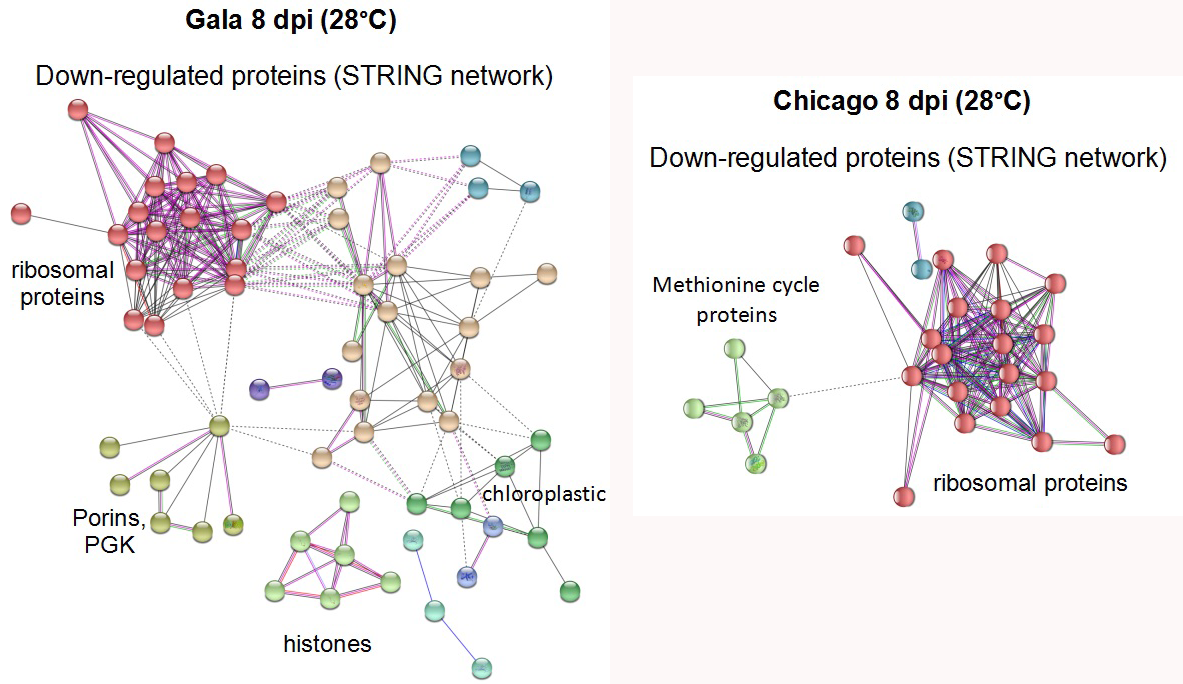
Внешний вид трансгенных растений картофеля с оверэкспрессией гена RAB28 в условиях 21-ной засухи (отсутствие полива) и уровень вируса в линиях трансгенных растений, зараженных YВК при нормальной температуре и в условиях теплового стресса.
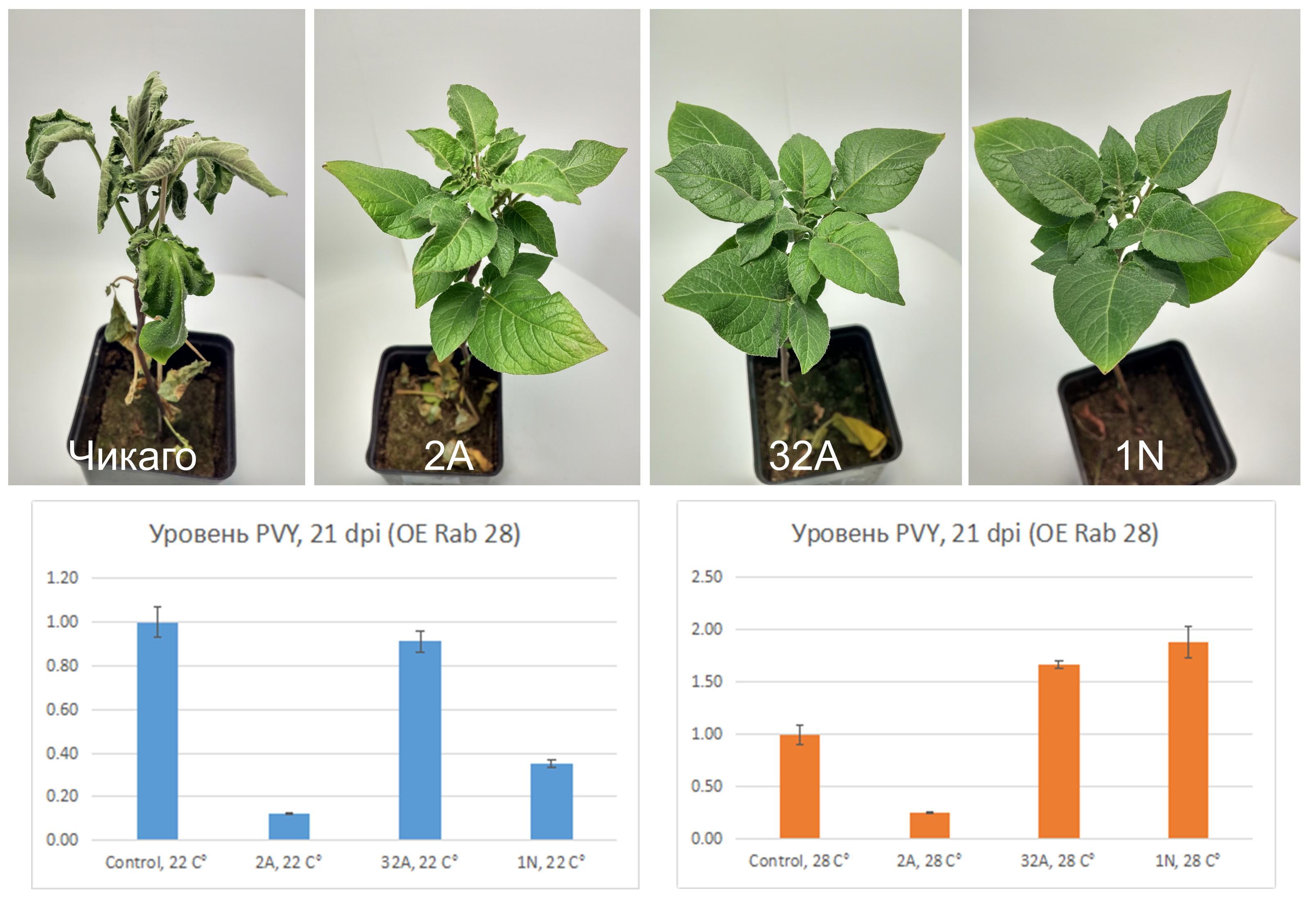
За 2017-2019 гг. опубликованы 6 статей (последняя планируемая статья находится на стадии подачи) в ведущих международных научных журналах, индексируемых в базе данных «Сеть науки» (Web of Science Core Collection) по направлению научного исследования, в научных изданиях, входящих в первый квартиль Q1. Поданы 2 заявки на выдачу патентов. Полученные результаты были широко представлены отечественной и международной научной общественности на 16 международных конференциях в докладах (устных и стендовых). По материалам исследований в стадии подготовки находятся 3 кандидатские диссертации. В ноябре будет проведена итоговая всероссийская конференция.
Избранные публикации:


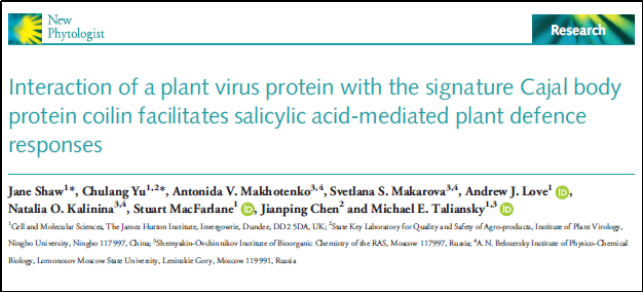
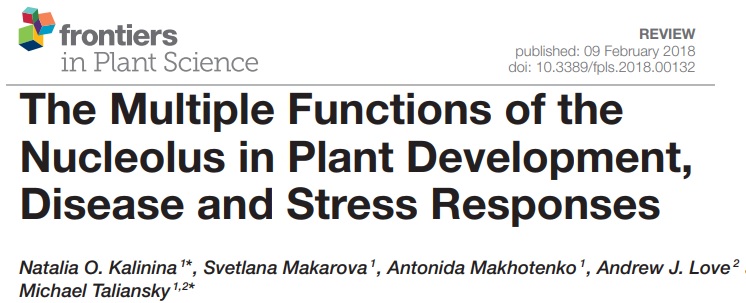
Участие в конференциях
В Филиале Института биоорганической химии имени академиков М.М.Шемякина и Ю.А.Овчинникова (г. Пущино) 12 ноября 2019г. был проведен симпозиум «Молекулярные механизмы устойчивости растений к экологическим стрессам и болезням» по итогам реализации Мегагранта № 14.W03.31.0003 «Новые функции клеточного ядра и комплексная устойчивость растений картофеля к болезням и физиологическим стрессам 2017-2019 гг.
Симпозиум открылся приветственным словом первого зам. директора ФИБХ РАН Ф.А.Мещерякова и докладом А.М.Чуенко, генерального директора Индустриального парка Рогачево, ведущего частного селекционно-генетического картофелеводческого центра, который является индустриальным партнером, со-финансировавшим настоящий проект. Особое внимание в своем докладе А.М. Чуенко уделил сотрудничеству между ИБХ и ФИБХ РАН, МГУ имени М.В.Ломоносова и ООО Дока Генные технологии в решении актуальных проблем картофелеводства.
Научная программа симпозиума включала две сеccии, посвящённые различным аспектам ответа растений на стресс различной природы и современным подходам к регуляции устойчивости растений к стрессам, а именно: «Ответы растений картофеля на биотический и абиотический стрессы. Участие ядерных белков в устойчивости картофеля к стрессам различной природы» и «Протеомный ответ растений на индивидуальный или комбинированный биотический/абиотический стрессы. Современные подходы к регуляции устойчивости растений к стрессам». В 12-ти докладах члены научного коллектива представили результаты исследований, полученные в ходе реализации мегагранта под руководством ведущего ученого М.Э. Тальянского.
В заключительной части симпозиума М.Э.Тальянский подвел предварительные итоги реализации проекта и определил перспективы и направления дальнейшего развития исследований и расширения сотрудничества с индустриальным партнером.
Для участия в симпозиуме зарегистрировались 52 участника. Среди зарегистрированных участников симпозиума 27 работают или учатся в ФИБХ РАН или ИБХ РАН, 10 - сотрудники, аспиранты и студенты МГУ имени М.В.Ломоносова (сотрудники НИИ ФХБ имени А.Н. Белозерского, биологического факультета, факультета биоинженерии и биоинформатики), 6 сотрудников ВНИИ сельскохозяйственной биотехнологии и 5 - ТСХА, 4 - ООО Дока Генные технологии.
__________
В 2019 году заведующий лабораторией Тальянский Михаил Эммануилович и с.н.с. Калинина Наталья Олеговна приняли участие в конференции Австралоазиатского общества фитопатологии (Australasian Plant Pathology Society Conference), проходившей в г.Мельбурн, Австралия с 25-28 ноября. Тальянский М.Э. выступил с устным докладом «Interaction of a plant virus protein with the scaffolding Cajal body protein coilin facilitates salicylic acid-mediated plant defence responses», а Калинина Н.О. представила стендовый доклад «Nuclear fibrillarin and coilin are negative regulators of potato plant resistance to biotic and abiotic stresses mediated by salicylic acid».
__________
Сотрудник лаборатории Молекулярных основ стрессоустойчивости растений Спеченкова Надежда Андреевна приняла участие в 44ой международной конференции FEBS «From molecules to living systems», которая проводилась с 6 по 11 июля 2019 года в городе Краков, Польша. Программа конференции включала в себя пленарные и стендовые доклады исследователей в ведущих областях молекулярной биологии, таких как геномное редактирование и протеомные технологии, биотехнология растений и белковая инженерия, а также проводились тематические научные дискуссии по интересующим направлениям.
В рамках конференции сотрудником был представлен стендовый доклад «Comparative proteomic analysis of two potato varieties under biotic and complex stresses».
__________
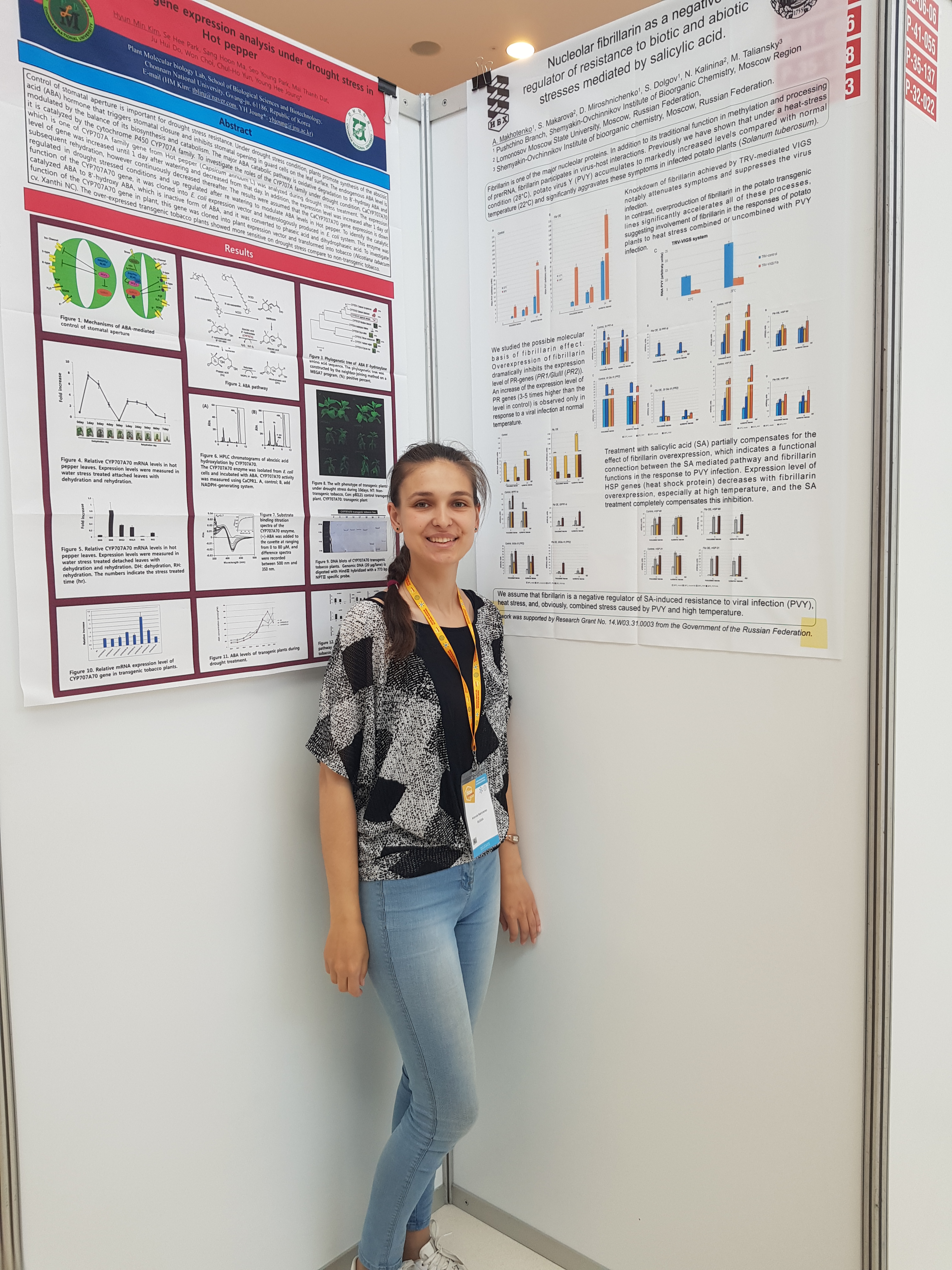
Сотрудник лаборатории Молекулярных основ стрессоустойчивости растений Махотенко Антонида приняла участие в 44ой международной конференции FEBS «From molecules to living systems», которая проводилась с 6 по 11 июля 2019 года в городе Краков, Польша. Программа конференции включала в себя пленарные доклады исследователей в ведущих областях молекулярной биологии, таких как биогенез РНК и редактирование ДНК, биотехнология растений и белковая инженерия, а также проводились тематические научные дискуссии по интересующим направлениям.
В рамках конференции был представлен стендовый доклад «Nucleolar fibrillarin as a negative regulator of resistance to biotic and abiotic stresses mediated by salicylic acid».
__________
Продолжается успешная реализации Мегапроекта «Новые функции клеточного ядра и комплексная устойчивость растений картофеля к болезням и физиологическим стрессам» Правительства России № 14.W03.31.0003.
Конференция «ПОСТГЕНОМ» является крупнейшей международной конференцией, ежегодно проводимой в Российской Федерации. Она представляет собой площадку для обмена знаниями и наработками ведущих отечественных и зарубежных ученых, работающих в фундаментальных и прикладных областях науки. Несмотря на то, что основная направленность конференции - это вопросы персонализированной медицины, оргкомитет постоянно расширяет тематику, включая в программу конференции доклады о современных достижениях в области наук о жизни для обмена опытом и знаниями между специалистами разных отраслей. М.Э.Тальянский был приглашен выступить с докладом на конференции «ПОСТГЕНОМ-2018». Также на конференции Калининой Н.О. было представлено постерное сообщение о молекулярном ответе растений картофеля на стрессы различной природы.
Конференция EMBO 2018 г. была посвящена вопросам изучения роли мишени рапамициновой (TOR) киназы, которая является основным регулятором роста клеток эукариот. Последние данные показывают, что TOR объединяет сигналы, возникающие в результате биотических и абиотических стрессов, для управления и регулирования роста, метаболизма и развития растений, способствуя анаболическим и катаболическим клеточным процессам, таким как биосинтез белка, транскрипция, рибосомный биогенез и аутофагия. Членом научного коллектива Н.О.Калининой был представлен постерный доклад «Response of potato (Solanum tuberosum cv.Chicago) plants to biotic, abiotic and combined stresses».
Основанная в 1963 году, Международная ассоциация биотехнологии растений является крупнейшей международной профессиональной организацией, представляющей интересы специалистов биотехнологии растений всего мира, и с начала 60-х годов успешно проводит симпозиумы по всему миру, посвященные наиболее значимым тематикам в области растительной биотехнологии, такие как культивирование in vitro и морфогенез, продовольственная безопасность, питание растений и многое другое. Членом научного коллектива Д.Н. Мирошниченко был представлен постерный доклад.
15 августа 2018 года на базе ООО «Дока-Генные Технологии» ведущего частного селекционно-генетического центра (с. Рогачево Дмитровский район, Московская область) проведен Картофельный Форум 2018, посвященный перспективным технологиям и инновациям в агроиндустрии. Организаторами Форума выступили ООО «Дока-Генные Технологии», Институт биоорганической химии им. академиков М.М. Шемякина и Ю.А. Овчинникова РАН, Ассоциация производителей семенного картофеля «Новый Картофель» при поддержке Российского научного фонда, Министерства сельского хозяйства Российской Федерации, Фонда содействия инновациям, Фонда «Сколково». В работе Форума приняли участие помощник Президента Российской Федерации А.А. Фурсенко, секретарь Совета Федеральной научно-технической программы развития сельского хозяйства на 2017-2025 годы Е.К. Нечаева, генеральный директор Фонда содействия инновациям С.Г. Поляков, академик, вице-президент РАН И.М. Донник, академик, директор Института биоорганической химии им. академиков М.М. Шемякина и Ю.А. Овчинникова РАН А.Г. Габибов, помощник Министра высшего образования и науки Е.В. Журавлева, руководитель Управления программ и проектов Российского научного фонда А.Н. Блинов, проректор РГАУ МСХА им. К.А. Тимирязева С.Л. Белопухов, Министр сельского хозяйства Московской области А.В. Разин, Глава Дмитровского района Е.Б. Трошенкова. В рамках Форума мегапроекта И.А.Фесенко был сделан доклад об омиксных технологиях как инструменте поиска генов, отвечающих за полезные признаки растений, в частности за устойчивость к комплексным стрессам.
Конгресс FEBS представительное и авторитетное научное мероприятие. Основная научная программа включает пленарные лекции от выдающихся исследователей, работающих в областях, представляющих большой интерес, и ряд тематических симпозиумов, предоставляющих открытия от ведущих экспертов в области молекулярных наук о жизни. Членом научного коллектива А.В. Махотенко было представлено постерное сообщение.
__________
Руководитель проекта, М. Тальянский, принял участие в работе 17-го Международного Конгресса Союза Mикробиологических Oбществ в Сингапуре (17-21 июля 2017 года). В течение пяти дней около 3000 учёных, исследователей, аспирантов и студентов со всего мира обсуждали последние достижения в области прикладной микробиологии, микологии и вирусологии, в том числе все аспекты исследований и новых вызовов, представляющих опасность для здоровья человека, животных, растений и окружающей среды. М. Тальянский представил работу, выполненную в рамках мегапроекта, по изучению роли клеточного ядра и суб-клеточных структур, ядрышка и телец Кахаля, в клеточном цикле и системной инфекции вируса Y картофеля.
Полученные в ходе исследований результаты были представлены на российских и международных конференциях. А.Н. Игнатов представил результаты исследований, посвященных различным аспектам генетики и эволюции патогенных бактерий, поражающих широкий круг растений-хозяев, в том числе растения картофеля, а также разнообразию отдельных бактериальных белков и антибактериальной активности наночастиц серебра и наночастиц комплексного состава (серебро/медь) в виде докладов и стендовых сообщений на II-й Всероссийской конференции с международным участием «Высокопроизводительное секвенирование в геномике» г.Новосибирск (2 доклада); на 8-й Московской конференции по вычислительной молекулярной биологии МССМВ'17 г. Москва (1 сообщение); в Международной научной конференции по биоорганической химии «XII ЧТЕНИЯ ПАМЯТИ АКАДЕМИКА ЮРИЯ АНАТОЛЬЕВИЧА ОВЧИННИКОВА» и VIII Российском симпозиуме «БЕЛКИ И ПЕПТИДЫ» (2 сообщения); в конференции Общества прикладных биологов (Association of Applied Biologists) Advances in IPM 2017: Reinventing agriculture to reduce dependency on pesticides в Harper Adams University, Newport, Shropshire, UK (1 сообщение); в конференции Британского общества фитопатологов BSPP (British Society of Plant Pathologists)/BMS (British Mycological Society) Joint presidential Conference (1 сообщение).
На 42-ом конгрессе Федерации европейских биохимических обществ «От молекулы к клетке и обратно» (42nd FEBS Congress «From molecules to cells and back») С.С.Макарова представила результаты, свидетельствующие о возможной роли белков ядра коилина и фибрилларина в устойчивости растений к абиотическим стрессовым факторам (постерное сообщение). Исследование проводилось на листовых дисках растений Nicotiana benthamiana и N.tabacum дикого типа и трансгенных растениях с подавленной экспрессией генов коилина и фибрилларина. Листовые диски помещали в гиперосмотическую среду или среду, содержащую перекись водорода. Трансгенные растения оказались более устойчивы к обоим типам стресса. Исследования по устойчивости целых трансгенных растений к гиперосмотическому стрессу подтвердили результаты, полученные на листовых дисках.
| ФИО | Должность | Контакты |
|---|---|---|
| Тальянский Михаил Эммануилович, проф., д.б.н. | г.н.с. | |
| Калинина Н.О., д.б.н. | с.н.с. | |
| Митюшкина Татьяна Юрьевна, к.б.н. | с.н.с. | |
| Гороховатский Андрей Юрьевич, к.х.н. | н.с. | |
| Каратаева Т.А. | м.н.с. | |
| Спеченкова Надежда Андреевна, к.х.н. | м.н.с. | |
| Кулиева М.В. | ст. лаб. | |
| Логвиненко Е.С. | ст. лаб. | |
| Мельник И.В. | ст. лаб. | |
| Мельник О.А. | ст. лаб. | |
| Павлова Ю.В. | ст. лаб. | |
Ранее здесь работали | ||
| Арсланова Л.Р., к.б.н. | ||
| Фахранурова Л.И. | ||
| Берзина Мария Яновна, к.х.н. | ||
| Кабанова А.П. | ||
| Махотенко А.В. | ||
| Тюрикова О.В. | ||
| Хромов А.В. | ||
| Комков А.С. | ||
| Безлихотнова А.А. | ||
 Загрузка...
Загрузка...Научные проекты
 Загрузка...
Загрузка... Загрузка...
Загрузка...
